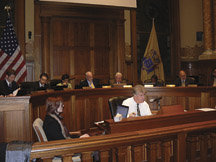Despite an extra $14 million in aid given to Jersey City by the state last week, the city’s $507 million budget may still result in a major tax increase.
The City Council voted 8-1 Wednesday night to introduce the budget after the city received the new state aid numbers.
Introduced more than six months into the 2009-2010 fiscal year, the budget is up $32 million over the 2008-2009 budget. It asks the public to contribute more than $195 million in taxes, up $44 million over last year.
This is an attempt to close a budget deficit conservatively estimated to be over $40 million.
The City Council introduced the $507 million municipal budget on Wednesday.
________
The city has already begun saving $2 million by furloughing employees on certain days of each month, but the money adds up to a small amount of what must be made up.
No tax relief
City Councilman Steven Fulop, who was the lone vote against the introduction of the budget, spoke about the tax levy after the meeting. He said if the tax levy stays at the current amount, the owner of a home assessed at $100,000 could see an $800 increase in their tax bill in just the first quarter of 2010.
The tax levy is the total amount that needs to be raised by taxes. The amount that each individual must pay depends on how many taxpayers are sharing the burden. City officials did not respond to questions about the tax rate for homeowners by press time.
The payment for the first quarter is due Feb. 1.
Fulop tried to introduce legislation to allow homeowners to apply for a plan in which they pay over a period of up to three years at low interest. However, the council voted 7-2 to reject the legislation.
Fulop and Councilwoman Viola Richardson were the only two council members to vote for the proposal. Both received applause after their votes.
Fulop said council members had little to say about the budget because they received a copy of it only five minutes before the meeting.
Fulop voted against resolutions introducing the budget and authorizing the city’s tax collector to mail out estimated tax bills to homeowners. He also abstained on voting for resolutions accepting the $14 million aid and authorizing an accelerated sale of tax liens, a potential source of revenue.
A taxing situation
Tax bills are due on Feb. 1, May 1, Aug. 1 and Nov. 1 of each year, despite the fact that the budget runs from July 1 through June 30.
In the upcoming estimated tax bill, homeowners will be hit with an increase of nearly 30 percent for the first quarter. For the second quarter payment due on May 1, by which time the budget is expected to be passed, taxpayers might pay less if the tax levy is reduced.
Last summer, the council approved a preliminary municipal tax levy of $170 million in order to send out property tax bills for the third and fourth quarter of the 2009 calendar year. That resulted in an 11.25 percent tax increase.
At the time, city Business Administrator Brian O’Reilly said that was done to move “cash flow” into the city’s coffers to start the new fiscal year. He also said at the time that the administration will be looking to lower the tax levy in the second half of the fiscal year.
Ricardo Kaulessar can be reached at rkaulessar@hudsonreporter.com.
